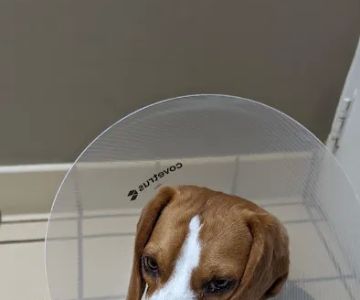Dental Cleanings for Pets: Why They Are Essential for Your Pet's Health
As pet owners, we always want the best for our furry friends, and dental health is one of the most important yet often overlooked aspects of their overall well-being. Dental cleanings for pets are not just about keeping their breath fresh—they play a crucial role in preventing serious health issues. In this article, I will share why regular dental cleanings are essential for pets, how to identify potential dental problems, and what you can do to ensure your pet’s mouth stays healthy.
The Importance of Dental Care for Pets
We often think of dental hygiene as something that only applies to humans, but did you know that dental health is just as important for pets? In fact, dental disease is one of the most common health problems seen in pets today. It is estimated that by the age of three, most pets have some form of dental disease. This can range from mild tartar build-up to more severe conditions like gingivitis or periodontal disease. Without proper care, these issues can lead to tooth loss, infections, and even affect internal organs such as the heart and kidneys.
Signs Your Pet Might Need a Dental Cleaning
Many pet owners are unaware of the signs that indicate their pet may need a dental cleaning. Pets can’t tell us when their teeth hurt, so it’s important to be vigilant and look for subtle clues. Some common signs include:
- Bad breath (halitosis)
- Yellow or brown tartar buildup on their teeth
- Red, swollen gums or bleeding gums
- Pawing at their mouth or face
- Difficulty eating or chewing food
- Excessive drooling
If you notice any of these signs, it’s time to schedule a dental check-up with your veterinarian. Early intervention can prevent more severe dental problems from developing.
Why Professional Dental Cleanings Are Essential
You might be wondering why a professional cleaning is necessary when you can brush your pet’s teeth at home. While brushing your pet’s teeth regularly is essential, it doesn’t always remove tartar that builds up below the gum line. Professional cleanings performed by a veterinarian involve a thorough examination and a cleaning process that includes scaling the teeth and polishing them. This helps remove plaque and tartar that brushing alone cannot reach.
During a professional cleaning, the veterinarian will also check for signs of other issues, such as infections or loose teeth, and provide treatment as needed. This level of care goes beyond what can be done at home and ensures your pet’s dental health is properly managed.
How Dental Cleanings Benefit Your Pet's Overall Health
Dental disease is not just about bad breath. If left untreated, it can lead to much more serious health problems. Bacteria from an infected mouth can travel through the bloodstream and affect vital organs such as the heart, liver, and kidneys. Studies have shown that pets with poor dental health are at a higher risk of developing conditions such as heart disease and kidney failure.
By keeping your pet’s teeth clean, you can help prevent these severe health issues and promote a longer, healthier life. A clean mouth not only improves your pet’s quality of life but also enhances their comfort and well-being. They will be able to eat more easily, enjoy playtime, and live pain-free without the discomfort of dental issues.
What to Expect During a Pet’s Dental Cleaning Procedure
Understanding what happens during a dental cleaning procedure can help alleviate any concerns you may have about your pet’s comfort and safety. The process typically involves the following steps:
- Pre-Procedure Evaluation: Your veterinarian will assess your pet’s overall health and may perform blood tests to ensure they are healthy enough for anesthesia.
- Anesthesia: For the safety and comfort of your pet, they will be put under general anesthesia. This allows the veterinarian to perform a thorough cleaning without causing discomfort or stress to your pet.
- Cleaning and Scaling: The veterinarian will use specialized tools to remove plaque and tartar from both above and below the gum line. This step helps prevent gum disease and tooth decay.
- Polishing: After scaling, your pet’s teeth will be polished to create a smooth surface that helps prevent plaque from building up in the future.
- Post-Procedure Care: After the cleaning, your veterinarian will provide instructions for post-care. This may include recommendations for at-home oral hygiene routines and follow-up checkups.
The entire procedure is safe, and your pet will be monitored throughout the process to ensure their well-being. Most pets recover quickly and are able to resume their normal activities the very next day.
How to Maintain Your Pet's Oral Health at Home
While professional dental cleanings are essential, there are also things you can do at home to help maintain your pet’s oral health between visits. Here are some tips:
- Brush Your Pet’s Teeth Regularly: Just like humans, brushing your pet’s teeth is one of the best ways to prevent plaque buildup. Use a pet-safe toothbrush and toothpaste, and aim to brush your pet’s teeth at least two to three times a week.
- Provide Dental Chews and Toys: There are many dental chews and toys designed to help reduce plaque and tartar buildup. These can be a fun and tasty way to promote good oral health while keeping your pet entertained.
- Feed a Healthy Diet: A balanced diet that includes high-quality food can help promote good dental health. Some pet foods are specifically formulated to help reduce plaque and tartar formation.
- Regular Checkups: Schedule regular veterinary checkups to ensure your pet’s dental health is on track. Your vet can provide advice and recommendations for at-home care.
Success Stories: The Impact of Regular Dental Cleanings
Let me share a heartwarming story from my own experience as a pet owner. I had a sweet dog named Max, who was a little older and began showing signs of discomfort when eating. His breath had started to smell really bad, and he was constantly pawing at his mouth. After a thorough examination, the vet found that Max had significant tartar buildup and gingivitis. We decided to go ahead with a professional dental cleaning, and it was the best decision we made. Not only did Max’s breath improve, but he also became more energetic and playful. It was amazing to see the transformation, and I couldn’t be more thankful for the dental care he received.
Many pet owners report similar experiences. Pets who undergo regular dental cleanings often live longer, healthier lives, free from the pain and complications caused by dental disease. It’s truly a simple step that can make a huge difference in your pet’s overall health and happiness.
Conclusion
Dental health is a critical part of your pet’s well-being, and regular professional cleanings play a vital role in maintaining their health. From preventing serious diseases to improving your pet’s quality of life, there are countless benefits to investing in your pet’s dental care. With the right at-home care and regular professional cleanings, you can ensure your furry friend enjoys a long, happy, and healthy life.
For expert dental care for your pet, consider visiting Hidden Brook Veterinary, where we provide comprehensive dental services to keep your pet’s smile bright and healthy.











